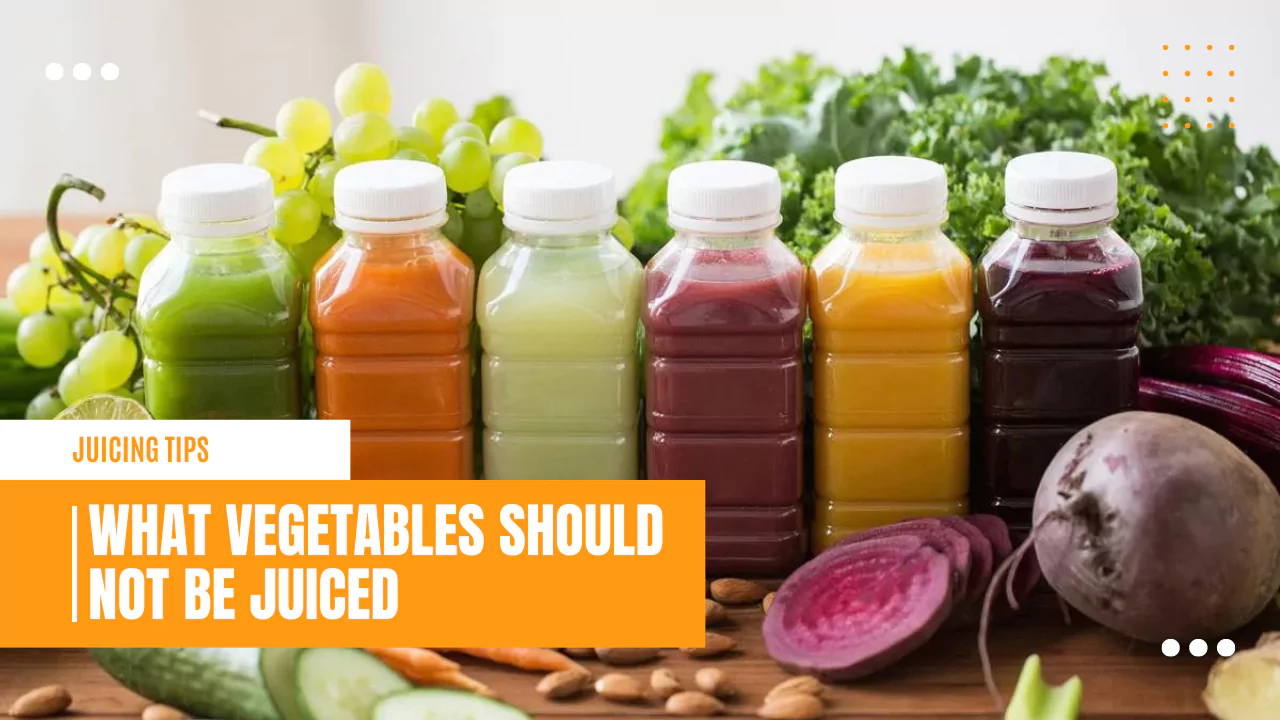Juicing has grown in popularity as a means to include more fruits and vegetables in our diets. It offers a practical and effective way to extract vital vitamins, minerals, and nutrients from fresh fruit. Not all veggies, meanwhile, are suitable for juicing. As a veggie juice lover, you must know What Vegetables Should Not Be Juiced.
In this extensive guide, we will examine the veggies that shouldn’t be juiced and the justifications for this exclusion. You can make educated judgments about your juicing routine and ensure you get the most out of this healthy habit by knowing which veggies to avoid.
Also Read: Dehydrating Cherry Tomatoes – Easiest Way
Is Juicing Better For You?
Juicing makes consuming a concentrated number of nutrients simple, making it a helpful option to include more fruits and vegetables in your diet. It is necessary to remember that juicing eliminates the product’s fiber content, which is essential for digestion and satiety.
Juicing can quickly enhance vitamin and mineral intake but should differ from whole fruits and vegetables. To maximize the health advantages, eating a balanced diet that includes whole fruits and vegetables and freshly squeezed juices is advised. To reduce the possibility of exposure to dangerous chemicals, it is also vital to consider the quality of the components used in juicing. Organic and pesticide-free food is preferred.
Can You Juice Any Fruits And Vegetables Together?
Any fruits and vegetables can be juiced together. Juicing is a flexible way of removing the liquid from fruits and vegetables, enabling you to blend several types to make one-of-a-kind nourishing concoctions. You may take advantage of various vitamins, minerals, antioxidants, and phytochemicals in varied produce by juicing multiple fruits and vegetables.
To achieve a tasty flavor and consistency, it is crucial to consider the flavors and textures of the items you are mixing. Additionally, specific fruits and vegetables may produce more juice than others, so it is wise to try several combinations to see which suits your preferences the most.
How To Combine Fruits And Vegetables For Juicing?

Following are the ways to mix fruits and veggies for juicing efficiently. You can combine these ingredients easily as they are the best vegetables to juice for energy.
- Choose a selection of fruits and vegetables that you appreciate and are complementary to one another in terms of flavor and health benefits.
- To get rid of any dirt or pesticides, carefully wash every piece of vegetable.
- If necessary, peel the fruits and take out any seeds or pits.
- Cut the fruits and vegetables into smaller pieces to fit in your juicer.
- Try out several combinations to discover your favorite flavor.
- To achieve a uniform distribution, feed the fruits and vegetables into the juicer one at a time, switching between various kinds.
- Before drinking, thoroughly stir the juice to combine all the flavors.
- To maintain the juice’s optimal freshness and nutritional content, serve it immediately.
Which Fruits And Vegetables Should Not Be Juiced Together?
Due to their varied nutritional profiles and potential for digestive issues, knowing what fruits and vegetables should not be juiced together is crucial. Oranges, grapefruits, and lemons should not be combined with bananas, grapes, or melons, which are sweet fruits. This is because citrus fruits are acidic and can induce intestinal discomfort by curdling the milk-like proteins found in sweet fruits.
Furthermore, high-sugar fruits like pineapples or mangoes shouldn’t be mixed with leafy greens like spinach, kale, or Swiss chard. When coupled with lush gardens, the high sugar content of these fruits can quickly raise blood sugar levels, which may not be suitable for those with some medical issues.
It’s crucial to remember that even while certain combinations might not be suggested for juicing, they can still be eaten independently or in other food preparations. Before making any significant dietary changes, speaking with a healthcare provider or nutritionist is essential.
Best Vegetables To Juice For Energy
Kale, spinach, and carrots are these veggies that are a natural source of energy and are stocked with critical nutrients that can help you feel more energized. Iron is abundant in kale, which allows the best vegetables to juice. The body carries oxygen around and keeps you from getting tired.
Magnesium is a mineral significant in spinach and essential for turning food into energy. Antioxidants and beta-carotene, abundant in carrots, can boost energy generation and increase general stamina. You may start your day with a calm and energizing beverage by including these veggies in your daily juicing regimen.

What Vegetables Should Not Be Juiced?
People are concerned about what fruits not to mix when juicing. Know that vegetables should not be juiced for several reasons. Firstly, juicing removes the fiber from vegetables, an essential component of a healthy diet. Fiber aids in digestion, helps regulate blood sugar levels and promotes a feeling of fullness. By juicing vegetables, you are essentially stripping away this vital nutrient.
Secondly, juicing vegetables can lead to a higher intake of sugar and calories. When vegetables are juiced, their natural sugars become concentrated, producing higher sugar content. This can be problematic for individuals with diabetes or those trying to manage their weight. Additionally, without the fiber to slow digestion, the body absorbs the sugar more quickly, leading to potential spikes in blood sugar levels.
Lastly, juicing vegetables can lead to nutrient loss. Some vitamins and minerals are sensitive to heat and oxygen exposure, which occurs during the juicing process. This can reduce the overall nutritional value of the juice compared to consuming whole vegetables.
List Of Vegetables Suitable For Juicing
- Cucumbers
- Sweet Potatoes
- Celery
- Carrots
- Beets
- Ginger
- Parsley
- Turmeric
- Fennel
- Lime or Lemon
- Wheatgrass
- Spinach
- Romaine lettuce
What Are The Alternatives?
Juicing certain vegetables is a popular alternative to consuming them in whole form. You can obtain a concentrated dose of nutrients and antioxidants by extracting the juice from vegetables. Common juiced vegetables include carrots, kale, spinach, cucumbers, beets, and celery. These vegetables are rich in vitamins, minerals, and phytochemicals that can support overall health and well-being.
Carrot juice is known for its high beta-carotene content, which is converted into vitamin A in the body. Vitamin A is essential for maintaining healthy vision, promoting immune function, and supporting skin health. Kale and spinach are leafy greens packed with vitamins A, C, and K and minerals like iron and calcium. These nutrients contribute to bone health, blood clotting, and immune system function.
Cucumber juice is refreshing and hydrating due to its high water content. It also contains antioxidants like vitamin C and beta-carotene. Beets are another popular vegetable to liquid because they are rich in nitrates, which can help improve exercise performance and lower blood pressure. Additionally, beets contain betaine, a compound that supports liver function.
Celery juice has gained popularity for its potential health benefits. It is low in calories but rich in vitamins A, K, and C. Celery also contains compounds called phthalides that may have anti-inflammatory properties.
When juicing vegetables, it is essential to note that some nutrients may be lost during the juicing process due to oxidation or heat exposure. To minimize nutrient loss, it is recommended to consume the juice immediately after preparation or store it in an airtight container in the refrigerator for a short period of time.

What Are The Drawbacks Of Juicing?
Here are some of the cons of juicing you need to know:
What Should You Not Do While Juicing?
- Juicing removes the natural fiber found in fruits and vegetables, essential for digestion and maintaining a healthy gut.
- Juices can be high in sugar, especially when made from fruits. Consuming excessive sugar can lead to weight gain, increased risk of diabetes, and other health issues.
- Drinking juice alone may provide a different feeling of fullness than eating whole fruits and vegetables. This can lead to overconsumption and potential weight gain.
- The juicing process can cause some loss of heat-sensitive nutrients like vitamins C and B vitamins.
- Juicing can be costly, as large quantities of fruits and vegetables are needed to produce a small amount of juice.
- Preparing and cleaning up after juicing can be time-consuming, especially if done on a daily basis.
- Improper handling or storage of fresh produce used for juicing can increase the risk of bacterial contamination.
- Juicing often focuses on a few select fruits and vegetables, leading to a limited intake of different nutrients that can be obtained from a varied diet.
While juicing can be a healthy and beneficial practice, certain things should be avoided to ensure safety and maximize the nutritional value of the juice:
- It is essential not to rely solely on juicing as a complete meal replacement. Juices lack important nutrients like protein and fiber, so it is crucial to incorporate whole foods into your diet.
- Avoid organic or thoroughly washed fruits and vegetables, as they may contain harmful pesticides or bacteria.
- Do not store freshly made juice for extended periods, as it can quickly lose its nutritional value and become susceptible to bacterial growth.
FAQs
Is Fruit Juice Really That Healthy For You?
Fruit juice can be a part of a healthy diet when consumed in moderation, providing essential vitamins and minerals. However, it is important to choose 100% pure fruit juice without added sugars and to be mindful of portion sizes.
How To Prepare Vegetables For Juicing?
To prepare vegetables for juicing, wash them thoroughly, remove any tough stems or seeds, and chop them into smaller pieces that will fit into your juicer. It is essential to use fresh and organic vegetables for the best results.
Why Should You Avoid Juicing Potatoes?
Juicing potatoes should be avoided because raw potatoes contain toxic compounds called solanine and chaconine, which can cause digestive issues, headaches, and even paralysis if consumed in large amounts. Additionally, juicing potatoes removes the beneficial fiber content and may lead to a rapid spike in blood sugar levels.
Can You Juice Eggplants?
Yes, eggplants can be juiced, but they are not commonly juiced due to their bitter taste and high water content. Combining eggplant juice with other fruits or vegetables is recommended to balance the flavor.
Why Should You Avoid Juicing Rhubarb?
You should avoid juicing rhubarb because the leaves and roots of the plant contain toxic substances, such as oxalic acid and anthraquinone glycosides, which can be harmful to your health when consumed in large quantities. Additionally, juicing rhubarb may lead to a high sugar intake without the beneficial fiber in whole fruits and vegetables.
Conclusion
In conclusion, while juicing veggies might be a practical approach to increasing your vitamin intake, paying attention to the vegetables you pick is crucial. Vegetables, including potatoes, sweet potatoes, and beets, shouldn’t be juiced because of their high carbohydrate content, potential influence on blood sugar levels, and kidney stone formation risk. To receive the most nutritional value from these veggies, eating them raw or cooked is recommended.






